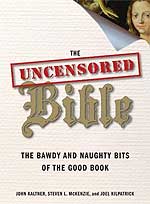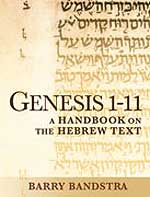 One of my summer reads that I just finished is a new book that takes a lighter — and somewhat irreverent and certainly risqué — look at the Hebrew Bible/Old Testament:
One of my summer reads that I just finished is a new book that takes a lighter — and somewhat irreverent and certainly risqué — look at the Hebrew Bible/Old Testament:
- The Uncensored Bible: The Bawdy and Naughty Bits of the Good Book by John Kaltner, Steven L. McKenzie, and Joel Kilpatrick (HarperCollins, 2008; Buy from Amazon.ca or Amazon.com).
Written by two biblical scholars and one satirist (I’ll let you decide who’s who!), this book is an entertaining examination of some provocative and downright outrageous interpretations of passages in the Holy Bible. The subtitle is a bit misleading in that the authors are only interested in certain “bawdy and naughty bits” of the Old Testament.
In order to make the cut (which they humorously refer to as the “Zevit Standard” since their first example was proposed by noted biblical scholar Ziony Zevit) the interpretation has to be (1) innovative and outrageous, (2) a new take on a familiar Bible passage, (3) plausible, and (4) proposed by a bona-fide biblical scholar. So what you don’t find in the book are all of the “bawdy and naughty” passages of the Bible which are clear and don’t require strange interpretations (like, for instance, the virtually pornographic/obscene descriptions of the Egyptians in Ezekiel 16:26 and 23:20 or the erotic physical descriptions in the Song of Songs. Of course, many of these “bawdy and naughty bits” are obscured by the prudish nature of modern English translations — but that’s another post!).
Some of the more outrageous interpretations from The Uncensored Bible include the following [SPOILER ALERT: skip this section if you want to be shocked when you read it for yourself]:
- The “rib/bone” which God makes the woman in Gen 2:21-22 was Adam’s penis bone
- The admonition to “casting your bread upon the waters” in Ecclesiastes 11:1 is a reference to ancient beer making (this suggestion comes from an article by fellow blogger Michael Homan)
- Ehud escaped after killing Eglon unnoticed by the Moabites by literally going down the poop chute in Judges 3:23 (not the “porch” or “vestibule” as most modern translations render misdaron)
- Isaac may have been “taking a whiz” in the field when Rebekah first saw him, according to Genesis 24:63.
- The “ish” (man/angel/God) in Genesis … touched Jacob’s, er… “johnson” during the wrestling match in Genesis 38? (and this was apparently some supernatural tit for tat since when Jacob was born, he was not clutching Esau’s heel, but his wiener!)
- The punishment for a wife grabbing another man’s genitals when he is fighting with her husband is not cutting off her hand (Deut 25:11-12), but giving her a Brazilian bikini wax!
[END SPOILER ALERT: Read on from here] Most of these interpretations I have encountered before, though not all of them. And while some of them are plausible and even convincing, others are a bit whacked out. The authors themselves do not agree with all of the interpretations they present; they consider some convincing while they (rightfully) reject others. There were a number of passages/interpretations that I expected to find in the book but didn’t (perhaps they are worth a blog post or two, or even a recurring series). In their conclusion the authors leave open the possibility of a sequel or two.
In case you are concerned, the authors did not write this book to bash the Bible or biblical scholarship. They are biblical scholars who “love the Bible” (p. xiii) and hope to increase their readers’ “appreciation for the richness and diversity of the Bible’s contents” (p. xiv). While this book will not be for everyone, I personally laud Kaltner and McKenzie for writing it (I wish I would have beat them to it). The value I see in a book such as this (besides its value as an entertaining read) is that it presents the Bible in a more down to earth and real way than many Sunday sermons. I think sometimes we Christians have an unrealistic (and unhelpful) view of the Bible. Pastors and teachers try to mine these ancient texts for modern-day role models or parenting tips, and I am not sure that is what the purpose of the good book is! Check out this quote from the Uncensored Bible:
Many people try to follow the Bible’s teachings so they can have a happy home. But the truth is, there aren’t many happy homes depicted in the Bible. The real inheritors of the Bible example are families who have experienced divorce, deception, adultery, and incest or have a murderer or rapist in the family. The Good Book is simply loaded with bad kin. And it’s a virtual handbook for how not to raise children. Most of us are better off doing as the Bible says, not as it shows (p. 153).
Amen and Amen! As I say to my students, one of the first steps to interpreting the Bible is to recognize that it comes from a world very different from ours. And this book helps us recognize that in a rather off-the-wall and quirky way.
In sum, I give this book two thumbs way up. If you have a slightly off-kilter sense of humor, then I highly recommend it (And if you don’t, then buy it for someone who does!)
(And, by the way, I hope the authors get their guest spot on the Daily Show; see p. xv).

 So, as I mentioned in a
So, as I mentioned in a 